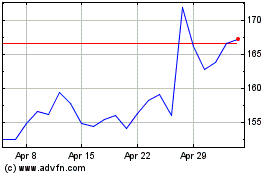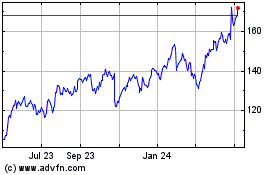By Abigail Summerville
Roku Inc. is tiny compared with the tech and telecom giants
spending billions to compete in the streaming-video world, but its
stock has more than tripled since Christmas on the growing
popularity of "over the top" video.
The Los Gatos, Calif., company, which started making set-top
boxes more than a decade ago to stream Netflix movies, today has
numerous content partners. The operating system that Roku licenses
to smart-TV makers recently surpassed Samsung's as the country's
top-selling smart-TV platform, according to research firm Strategy
Analytics. And Roku's media-streaming sticks and boxes regularly
outsell players from Apple Inc., Alphabet Inc.'s Google and
Amazon.com Inc., Roku's biggest competitor in the U.S.
But Roku's success isn't based on hardware sales. It says it
doesn't really make any money on sales of smart TVs from its
licensees, which include Hisense, TCL and Sharp. It makes money
when people start watching.
Roku's greatest source of revenue since 2018 has been
advertising -- in its partners' ad-supported videos, on its home
screen and even on the buttons of its remote.
Roku shares shot up more than 20% Thursday following its
quarterly earnings report late Wednesday that beat expectations,
including $250.1 million in revenue, 30.5 million active accounts
and a net loss of $9.3 million.
Roku finds itself in a prime position at a time when companies
are increasingly looking to advertise on platforms like Roku
instead of on cable TV -- and when uncertainty among
video-streaming providers leads people to subscribe to multiple
services. "Our whole business is based on the belief that TV will
move to streaming," Roku Chief Executive Anthony Wood said in an
interview.
Still, Roku has had struggles: It is no longer developing a
previously announced voice assistant, and it has been slow to roll
out an ambitious whole-home entertainment platform. Dependence on
viewer data could hurt its ad business amid new consumer-privacy
regulations, and it has yet to make big moves outside of the U.S.
As the company figures out how to expand globally, its frenemies --
particularly Amazon -- could see it as a bigger threat.
"I think a few years ago we would have said [Roku's] big
downfall would be if it doesn't evolve," said Michael Greeson,
president of TDG Research. "It overcame that and made smart
decisions."
What Roku brings to the living room is "over the top" video,
which refers to video delivered directly over the internet instead
of via traditional broadcast and cable networks. Total U.S. ad
revenue for these services, not including YouTube or social media,
hit $2.7 billion in 2018, according to media-research group Magna
Global. Hulu was No. 1, at $1.5 billion in ad revenue, and Roku was
second. While it doesn't break out ad revenue, Roku reported $416
million in platform revenue last year -- the vast majority of it
from ad sales. Advertising analysts say Amazon's share is smaller
but also increasing.
Because Roku doesn't have its own content, it is in a position
to partner with many competing sides, as the streaming market
becomes oversaturated: Roku already has Netflix, Amazon Prime, Hulu
and many more services. This fall, Disney+ and Apple TV+ are set to
launch, followed by AT&T's HBO Max. All are expected to have
Roku apps.
Cable cutters have more devices than ever to choose from, but
Roku has an advantage over the bigger names: It isn't involved in
what the CEO calls "political battles." Roku has been left out of
skirmishes between tech's biggest rivals: For example, until July,
Google's YouTube wasn't available on Amazon Fire TV, and Amazon
Prime Video wasn't available on Google Chromecast. Walmart, the
world's largest retailer, doesn't sell Amazon products.
"One of our advantages is that we're not one of those guys," Mr.
Wood said. An Amazon spokeswoman declined to comment on its
relationship with Roku.
While its rivals are used to competing on a global scale, Roku's
expansion outside the U.S. has been small. It hasn't announced an
international strategy, but Mr. Wood said, "We think it's an open
market. There are no leaders yet internationally."
Roku's smart-TV operating system could be its ticket abroad.
Most people outside the U.S. prefer smart TVs over streaming sticks
and boxes, Brett Sappington, principal analyst and senior director
of research at Parks Associates, said.
Regulations giving consumers greater control over their data
could potentially hamper Roku's advertising business. Europe's
General Data Protection Regulation , which took effect in May 2018,
could make it more difficult for Roku to have highly targeted ads.
And in the U.S., in the wake of California's landmark Consumer
Privacy Act, passed in June 2018, other states have proposed or
passed similar legislation. Mr. Wood said Roku's direct
relationship with viewers is an advantage.
Roku has scaled back some of its product ambitions. On
Wednesday, it announced a partnership with Walmart that includes
audio products under Walmart's Onn brand. But a Roku spokeswoman
confirmed it has canceled plans to launch an Alexa-like voice
assistant announced in January 2018.
Mr. Greeson said Roku is smart to stay away from Amazon's
voice-assistant turf.
"Roku can play the underdog card, and that's good for them if
they're too small right now for Amazon to notice," he said. "If
Roku becomes truly competitive against Amazon devices though,
Amazon can decide, 'Hell, let's give [Fire sticks] away for free.'
" On Prime Day last month, Amazon's Fire TV Sticks were a
top-selling item -- at $14.99.
Mr. Wood called Amazon a partner in content and a competitor in
hardware, but says Roku's lead is expanding. "We compete with them
well," he said.
(END) Dow Jones Newswires
August 08, 2019 12:26 ET (16:26 GMT)
Copyright (c) 2019 Dow Jones & Company, Inc.
Alphabet (NASDAQ:GOOGL)
Historical Stock Chart
From Mar 2024 to Apr 2024

Alphabet (NASDAQ:GOOGL)
Historical Stock Chart
From Apr 2023 to Apr 2024
